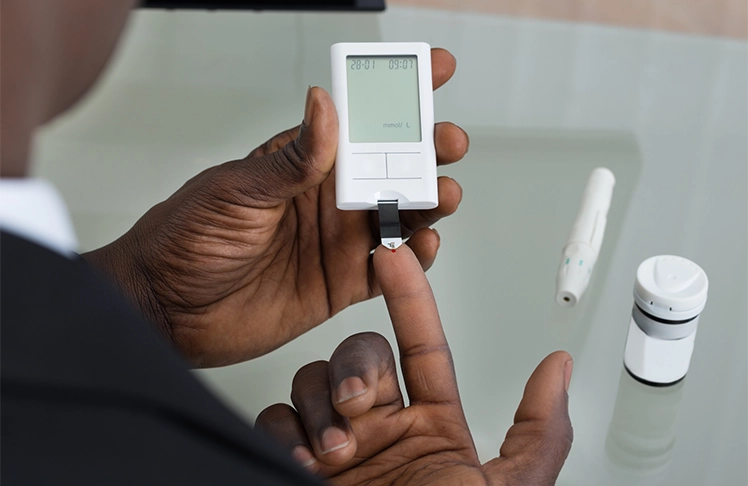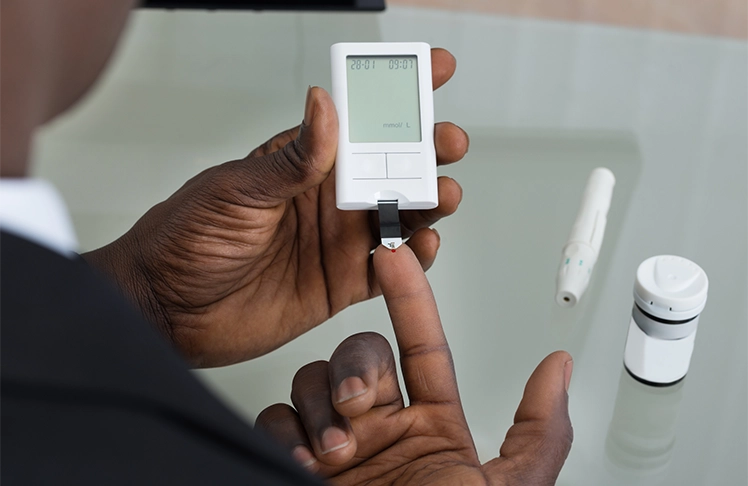
By Kiara Doyal, The Seattle Medium
November is National Diabetes Awareness Month, which is a reminder of just how deeply diabetes impacts our Black communities. According to the Centers for Disease Control and Prevention, Black adults are 60 percent more likely to be diagnosed with diabetes than non-Hispanic white adults, a disparity that needs urgent attention.
Experts like Lorena Alarcon-Casas Wright, an endocrinologist at the University of Washington Medical Center, say high blood sugar affects more than just glucose levels; it can damage the body in ways many people don’t realize.
“Diabetes is a metabolic disease that is characterized by high blood sugar in the blood, and when our blood sugar is really high in the blood, it becomes toxic to our blood vessels and our nerves,” said Alarcon-Casas Wright, an endocrinologist at the University of Washington Medical Center. “So then, the issue with that is that the development of diabetes causes complications in the eyes, heart, kidneys, feet and possibly skin.”
“High blood sugar is because the pancreas that produces insulin doesn’t produce enough,” she continued.
A common myth is that eating too much sugar directly causes diabetes. While excessive sugar can lead to weight gain, a risk factor for type 2 diabetes, Alarcon-Casas Wright said that the disease is not solely about sugar.
“High blood sugar is just one characteristic or symptom of diabetes,” said Alarcon-Casas Wright. “It is a very complicated disease that also affects fat, protein and our metabolism. It affects our liver and how we handle sugar, and just how our body actually uses sugar. So, it is actually not just about sugar, it is about our metabolism as a whole.”
Although many believe that medications are the primary solution for illnesses, Alarcon-Casas Wright says that lifestyle changes, such as diet and exercise, can be highly effective in reversing type 2 diabetes. Although making lifestyle changes can be very effective, if diabetes is diagnosed later, it’s usually harder to reduce medication and reverse the condition.
“Lifestyle modifications like diet and exercise are very effective. There are actually studies that look at how effective lifestyle modifications are compared to medications like Metformin, which is the most common medication that we use,” said Alarcon-Casas Wright. “The study actually showed that in people with pre-diabetes, lifestyle modifications were more effective at decreasing the rate of development of diabetes more effective than Metformin.”
“The earlier the diabetes is diagnosed, the more effective lifestyle changes are,” added Alarcon-Casas Wright. “It is always effective, but when diabetes is very advanced, diet and exercise will help control diabetes, but it might not be sufficient to reverse diabetes,” Alarcon-Casas Wright said.
When discussing lifestyle changes with her patients, Alarcon-Casas Wright said that the hardest adjustment is that they often place overly high and rapid expectations on themselves.
“We (people) put very high expectations on ourselves, and then we fail, then we might just totally abandon it, and that is what I sometimes see as a challenge for patients. They change their diet radically and exercise a lot, and sometimes it is not an attainable goal all at once,” Alarcon-Casas Wright said. “I always recommend starting with small changes, because sometimes we are too ambitious, which is great, but at times it is not sustainable. So, it’s better to strive for longevity, and then we will be more effective and be able to continue the changes being made.”
Going to the gym can feel intimidating or discouraging for some people trying to improve their health. For this reason, Alarcon-Casas Wright suggests that even simple exercise, like walking for 30 minutes after a meal, can significantly lower blood sugar and, in early-stage diabetes patients, may help reduce or even eliminate the need for medication.
“There have been studies of people with diabetes, and they look at walking for a period of time either at a slow pace or brisk walking, and then they compare the results,” said Alarcon-Casas Wright. “Brisk walking for 30 minutes was more effective than slow walking, and it reduces glucose by 40 points, which is significant. So something as simple as walking helps a lot, especially after eating.”
Drawing on her experience as an endocrinologist, Alarcon-Casas Wright believes that stress is what often distinguishes patients who manage diabetes successfully from those who struggle more with the disease.
“Stress plays a significant role in how patients are able to manage their diabetes. We might be stressed because we don’t have enough time to prepare meals from scratch or whole foods, as opposed to just grabbing something quick. So, I think stress management is very important, and I am not just talking about when we feel anxious in life in general,” said Alarcon-Casas Wright. “It is prioritizing our sleep and exercise and avoiding processed foods, and that is very complicated and can be stressful. The people I see who are having difficulty managing their diabetes are usually because they are faced with a lot of other social determinants of health that make it really challenging, because we all just want to do well.”
Like any health condition, being diagnosed with diabetes can be frightening. Fortunately, we live in an era where health care has advanced, offering many ways to support those in need.
“I always like to focus on the positives when a patient is newly diagnosed with diabetes. We have many different programs and strategies that can prevent complications of diabetes. I recommend having a provider whom you feel comfortable with to talk about your diabetes because it is a chronic disease,” said Alarcon-Casas Wright. “This is someone you are going to be continually seeing. When treating diabetes, it will take time and several steps, so focus on the positives, and as long as we go in the right direction, it is a positive.”

